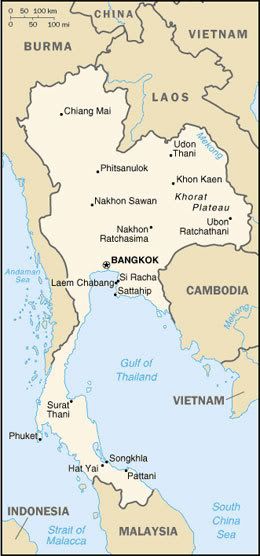 Wicked Diving and Golden Buddha Resort invite you to join a unique experience that supports eco-tourism and offers the opportunity to search for, identify, and track Whale Sharks in Thailand's Andaman Sea. The objective of the Whale Shark Exploration Program is to raise awareness by educating all participants about the elusive Whale Shark. Spend 4 days in an oceanfront house at Golden Buddha Resort, and 3 days diving (minimum 9 dives) at Richelieu Rock, Surin Islands, Koh Tachai, Koh Bon, and BonSoong Wreck.
Wicked Diving and Golden Buddha Resort invite you to join a unique experience that supports eco-tourism and offers the opportunity to search for, identify, and track Whale Sharks in Thailand's Andaman Sea. The objective of the Whale Shark Exploration Program is to raise awareness by educating all participants about the elusive Whale Shark. Spend 4 days in an oceanfront house at Golden Buddha Resort, and 3 days diving (minimum 9 dives) at Richelieu Rock, Surin Islands, Koh Tachai, Koh Bon, and BonSoong Wreck.
Event Date : Jan 31 - Feb 6, 2009
For more details go to: wickeddiving.com
 The shell of a Tridacna gigas giant clam on display in a Spanish museum. The species has not been seen in Thai waters for about 100 years.
The shell of a Tridacna gigas giant clam on display in a Spanish museum. The species has not been seen in Thai waters for about 100 years.
CAPE PANWA, PHUKET: With the colorful shell of the giant clam highly prized by aquarium owners, the lucrative but illegal trade in the species is causing the population of this marine mollusk to decrease dramatically and experts fear it may become extinct in its natural habitat.
The Giant Clam Rehabilitation Project now underway in Andaman coastal areas is working to preserve and spawn more giant clams, which have both male and female organs present in the same animal.
Yet while the illegal trade in the species continues, it is questionable how far releasing farmed clams into the wild will go to alleviating the problem.
Reference: MCOT
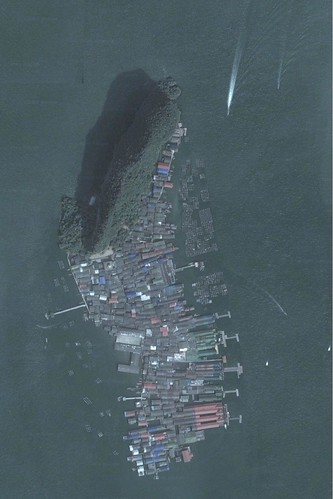 The sky is clear and the breeze is warm. It is a perfect day to go on a boat trip. We are on Phang Nga Bay and heading for the famous Koh Panyee. Koh Panyee is about 20 minutes by long-tail boat from Surakul pier in Phang Nga province.
The sky is clear and the breeze is warm. It is a perfect day to go on a boat trip. We are on Phang Nga Bay and heading for the famous Koh Panyee. Koh Panyee is about 20 minutes by long-tail boat from Surakul pier in Phang Nga province.
Many people flying into Phuket will have looked down on this village seemingly floating in the magical bay and wondered what it is like to live in the place. Phuket.com went out to Panyee to take a look and discovered the true meaning of the phrase, ‘a simple life’.
There are 1,485 people from 315 families who live permanently on Koh Panyee, the youngest being a baby boy born just a month before our visit. All of them are the descendants, directly or indirectly, of Toh Baboo and his family and friends, who were the first people to settle on Koh Panyee some 200 years ago.
Toh Baboo and two other families left their homeland in Indonesia by boat, looking for a new place to live. The three families made a vow to each other that if one of them found a place where there were lots of fish and where everyone could live, that they would signal the others by raising a flag on a mountain as high as possible, so that the others could see it and join them.
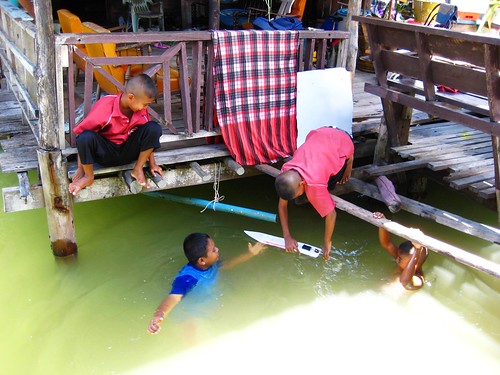 Toh Baboo discovered the island with its abundance of fish and, true to his promise, raised a flag atop its soaring cliff, That is how the island got its name, Koh Panyee – the Island of the Flag.
Toh Baboo discovered the island with its abundance of fish and, true to his promise, raised a flag atop its soaring cliff, That is how the island got its name, Koh Panyee – the Island of the Flag.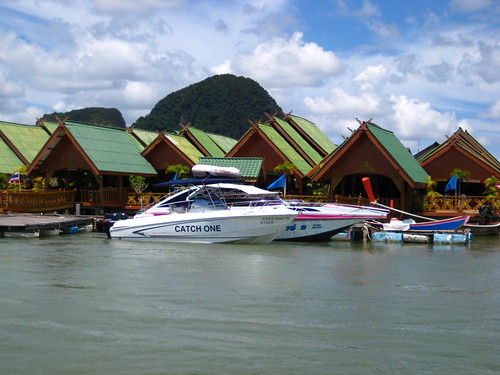
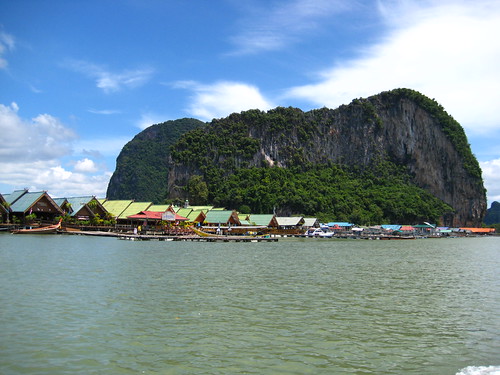 Koh Panyee is a small island. Most of it is huge, almost vertical, limestone cliffs. The hundreds of huts, shacks, restaurants and houses where the villagers live are built on stilts over the surrounding shallow sea. No one seems quite sure how many wooden and concrete piles hold up this extraordinary community, but it is certainly a fascinating and unique feat of informal engineering.
Koh Panyee is a small island. Most of it is huge, almost vertical, limestone cliffs. The hundreds of huts, shacks, restaurants and houses where the villagers live are built on stilts over the surrounding shallow sea. No one seems quite sure how many wooden and concrete piles hold up this extraordinary community, but it is certainly a fascinating and unique feat of informal engineering.

At first, fishing was the sole industry for this Muslim community but nowadays it is No 2. These days, half the locals service the tourism industry and 40% are still fisherman. The village has its own school, a mosque, a health center, lots of small souvenir shops and a handful of large restaurants, all facing the sea, where tourists can enjoy a fresh seafood lunch. The latest development on Koh Panyee is the construction of bungalows that offer overnight accommodation for as little as 300 baht.
The village has its own school, a mosque, a health center, lots of small souvenir shops and a handful of large restaurants, all facing the sea, where tourists can enjoy a fresh seafood lunch. The latest development on Koh Panyee is the construction of bungalows that offer overnight accommodation for as little as 300 baht.
You can rent a long-tail boat from Surakul pier for around 1,700 baht for three hours. The boat can carry up to ten people – so if you fill it up that’s just 170 baht a head.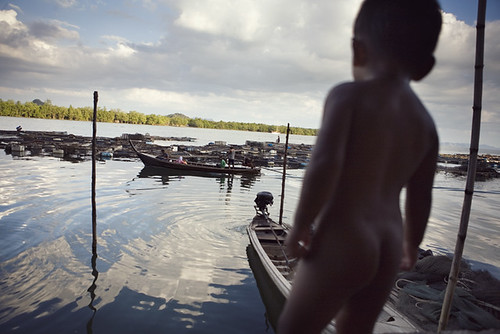 Alternatively, there are many good tours to Panyee which include pick-up from your hotel.
Alternatively, there are many good tours to Panyee which include pick-up from your hotel.
What to Wear? This is a Muslim community so women should not wear short skirts or shorts. T-shirts and jeans are acceptable but anything that exposes too much flesh risks a cold shoulder from the locals.
By Rungtip Hongjakpet Izmen (phuket.com)
Source Photo :![]() conse...
conse...![]() whatmysoulsees
whatmysoulsees![]() csaeys
csaeys![]() Vitaly Shepelev
Vitaly Shepelev

